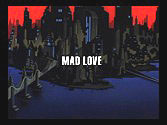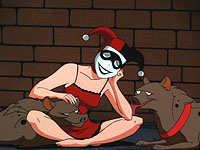|
||
|
| Credits | Cast | |
Story by Paul Dini & Bruce Timm Written by Paul Dini Directed by Butch Lukic Music by Shirley Walker Animation by Koko/Dong Yang |
Kevin Conroy as Batman Bob Hastings as Commissioner Gordon Mark Hamill as The Joker Arleen Sorkin as Harley Quinn Suzanne Stone as Dr. Joan Leland |
|
|
I repeat: Love has been a subject, motive or complication in drama since storytelling began. So why should not Batman avail itself of the same resource? So it is the loss of his loved ones that drives Bruce Wayne into the Batcave; and, more specifically, love (and its loss or frustration) is the key that winds the mainsprings of two of the series' most moving dramas, "Heart of Ice" and "Mad as a Hatter." It is also the obscure labyrinth at the heart of Paul Dini's greatest contribution to the Batman universe: Harley Quinn. Her relationship to the Joker has been explored briefly and indirectly before, in "Harlequinade" and "Harley & Ivy," and revealing vignettes are offered in "Joker's Millions" and "Beware the Creeper." So a question much on everyone's mind has been: Who is Harley Quinn, and how and why did she fall for Mr. J? The very success of those early, oblique episodes, however, suggests that the question may be more interesting than any answer. Love itself is a mystery: Why does anyone fall in love with anyone? "As an aide to the propogation of the species" is probably the truest answer, and it would be a cold and unpoetic answer even if it didn't seem to miss the point. It is not that all answers are irrelevant, but that the content of those answers is much less interesting than the act of attempting to answer them. The fact of love, and all the screwball tragedies and melancholy farces that accompany it, is subject matter enough for any story. But "Mad Love" purports to answer just such a question, even as it consistently shies away from its ostensible subject. The central story—how a clinical psychologist went goofy for the Joker—is treated quickly and perfunctorily within a flashback and has nothing particular to do with the events that surround it. Those events, set at a dentist's office and at an aquarium, have all the cocky aplomb we've come to associate with Dini's antic side, but the middle segment lacks the serene confidence of his tragedies. It is as if he suspected that Harley is a conceit unsuited for close scrutiny and sought to minimize our contact with that fragile core. Harley is a joke—but a warm, winsome, and deeply humanizing one; she is a brillinatly successful attempt to redeem the folly of love by turning it into a lark. To turn her story from one of laughter to one of tears would compromise that delicate balance. Which is why I prefer to think of "Mad Love" not as a partial failure but as an incomplete success; the fumble was in its attempt to explore her depths, and the recovery was in its unwillingness to peel her back in the dissecting tray. Love and laughter are possibly the deepest mysteries in life. Far better to leave them intact and attached to an unplumbed pixie than to pin them back like the wings of a dead butterfly. |
|
|
|
Related Episodes |
What Others Are Saying ... |
| Back to Love Is a Croc |
Forward to Mean Seasons |


